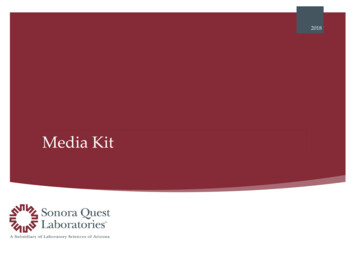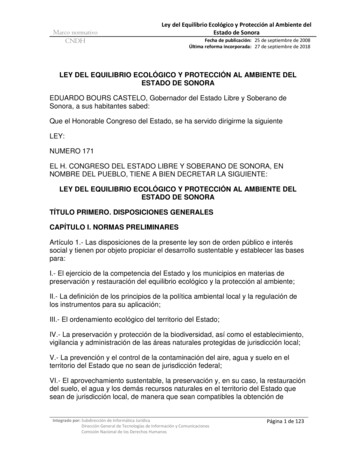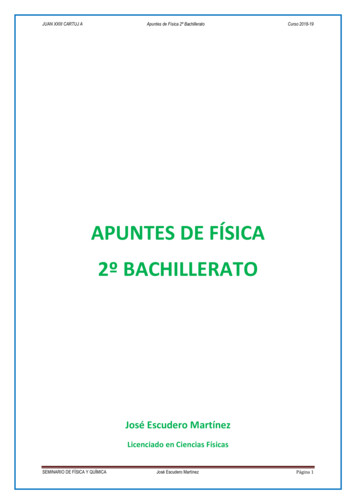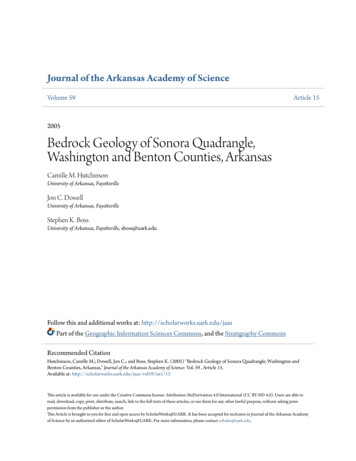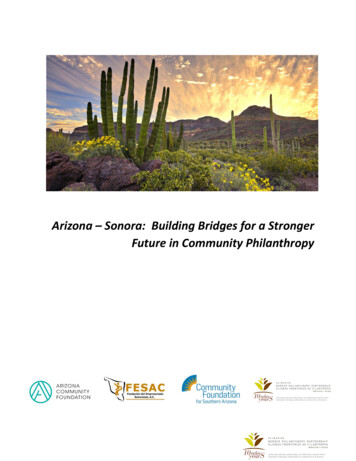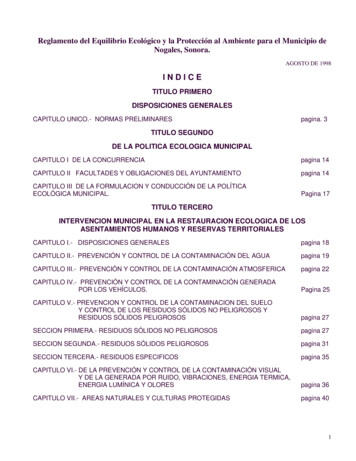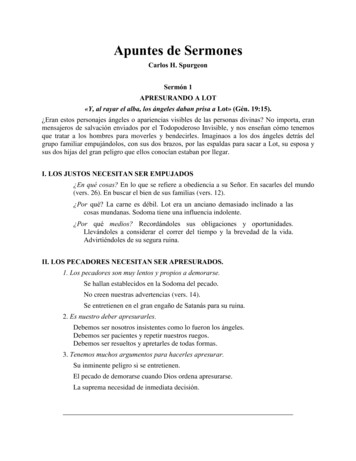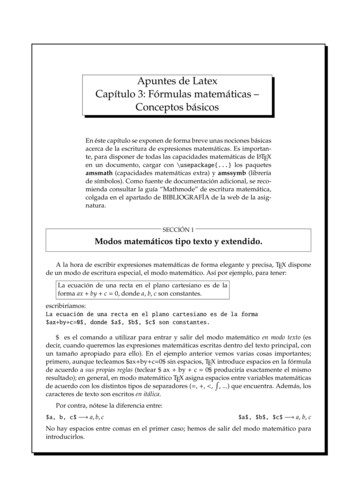
Transcription
3er GradoInglés IIIApuntesUnit 2. Rules and RegulationsUnit 3. Food and DrinkTS-APUNTES-ING-3-B2YB3-PRELIM.in2 216/7/08 11:24:18
La elaboración de Inglés III. Units 2 and 3. Apuntes, estuvo a cargo de la Dirección General deMateriales Educativos de la Subsecretaría de Educación Básica.Secretaría de Educación PúblicaJosefina Vázquez MotaSubsecretaría de Educación BásicaJosé Fernando González SánchezDirección General de Materiales EducativosMaría Edith Bernáldez ReyesCoordinación generalMaría Cristina Martínez MercadoElaboración de textosJezabel Barrera FuentesRevisiónJorge Barbiere MejíaClaudia Elín Garduño NéstorEstela Maldonado ChávezAsesoría pedagógicaAlejandra Montserrat Castillo RobledoKarina Bustos HernándezDiseño de portada e ilustracionesMarco Tulio Ángel ZárateFormación y correcciónDirección Editorial DGMEPrimera edición, 2008 (ciclo escolar 2008-2009)D.R. Secretaría de Educación Pública, 2008Argentina 28, Centro,06020, México, D.F.ISBN: 978-968-01-1743-7 (obra completa)978-968-01-1755-0 (units 2 and 3)Impreso en MéxicoDistribución gratuita-Prohibida su ventaTS-APUNTES-ING-3-B2YB3-PRELIM.in6 616/7/08 12:06:11
Table of contentsUnit 2Rules and 155586263646568Unit 2 / Rules and RegulationsLesson 31 Watch out! There’s a carLesson 32 Don’t feed the animalsLesson 33 A Mexican celebration / Actividades Cívico - CulturalesLesson 34 Don’t eat junk foodLesson 35 First aidLesson 36 Don’t run, don’t shout and don’t pushLesson 37 Smoking causes lung cancerLesson 38 Safety instructionsLesson 39 Mini CheckLesson 40 I have to study for the examLesson 41 You must clean your bedroomLesson 42 Students must wear a lab coat, they mustn’t forget itLesson 43 I have to do my homework and Wendy has to make a presentationLesson 44 You have to classify the trashLesson 45 She doesn’t have to wear a uniformLesson 46 Mini CheckLesson 47 Project: Making a set of rules. Part oneLesson 48 Project: Making a set of rules. Part twoLesson 49 Project: Making a set of rules. Part threeLesson 50 ReviewLesson 51 The Christmas season / Actividades Cívico - Culturales697374Answer Key/RespuestasMateriales de apoyoBibliografía21 sessions, 7 weeks / 21 sesiones, 7 semanas
Unit 3Food and 6127129130Lesson 52Lesson 53Lesson 54Lesson 55Lesson 56Lesson 57Lesson 58Lesson 59Lesson 60Lesson 61Lesson 62Lesson 63Lesson 64Lesson 65Lesson 66Lesson 67Lesson 68Lesson 69Lesson 70Lesson 71Lesson 72The marketThe supermarketI want a pizzaLet me see the menuMay I take your order?I’d like to order a sandwichMini CheckWhat’s your favorite dish?Do you like orange juice?Where are hamburgers from?What’s the traditional dish in your community?Is there any cheese?Mix all the ingredientsHow much milk do we need?How many eggs do you need?First, cut the tomatoesMini CheckProject: A recipe book. Part oneProject: A recipe book. Part twoProject: A recipe book. Part threeReview133138140Answer Key/RespuestasMateriales de apoyoBibliografía21 sessions, 7 weeks / 21 sesiones, 7 semanasEnfocus Software - Customer Support
PresentaciónLa Secretaría de Educación Pública, comprometida con la comunidad detelesecundaria —autoridades, docentes, alumnos, padres de familia—, se dio ala tarea de fortalecer el modelo de enseñanza-aprendizaje de esta modalidadeducativa. Este modelo fortalecido ofrece materiales que apoyan de manerasignificativa la comprensión y dominio de los contenidos de los planes deestudio vigentes.La serie de Apuntes Bimodales de Telesecundaria está desarrollada para quemaestros y alumnos compartan un mismo material a partir del trabajo deproyectos, estudios de caso o resolución de situaciones problemáticas. Coneste objetivo se han desarrollado secuencias de aprendizaje que despiertan elinterés de los alumnos por la materia, promueven la interacción en el aula ypropician la colaboración y la participación reflexiva, además de que empleanuna evaluación que orienta las decisiones tanto del docente como del alumno yestablecen estrategias claras de vinculación con la comunidad.Estos materiales, que la SEP pone ahora en manos de alumnos y maestros,expone de manera objetiva los temas, conceptos, actitudes y procedimientosnecesarios para un mayor y mejor entendimiento de cada una de las materiasque comprende la serie.El empleo de estos Apuntes Bimodales y las sugerencias que brinde lacomunidad de telesecundaria darán la pauta para el enriquecimiento y mejorade cada una de las ediciones de esta obra que busca contribuir a unaeducación equitativa y de calidad en el país.SECRETARÍA DE EDUCACIÓN PÚBLICA
En los Apuntes de Inglés se utilizaron iconos que representandeterminadas actividades. Los incluimos a continuación para facilitarsu identificación y uso.Speak / HablarThink / PensarPlay/ JuegaWrite / EscribirRead / LeerCheck your progress / Revisa tu avance
Unit2Rules and RegulationsPurposeThe purpose of this unit is to enable students to interpret and discuss rules andregulations and warning signs/notices, as well as to express obligation.TopicsLesson 31Lesson 32Lesson 33Lesson 34Lesson 35Lesson 36Lesson 37Lesson 38Lesson 39Lesson 40Lesson 41Lesson 42Lesson 43Lesson 44Lesson 45Lesson 46Lesson 47Lesson 48Lesson 49Lesson 50Lesson 51Watch out! There’s a carDon’t feed the animalsA Mexican celebration / Actividades Cívico – CulturalesDon’t eat junk foodFirst aidDon’t run, don’t shout and don’t pushSmoking causes lung cancerSafety instructionsMini CheckI have to study for the examYou must clean your bedroomStudents must wear a lab coat, they mustn’t forget itI have to do my homework and Wendy has to make a presentationYou have to classify the trashShe doesn’t have to wear a uniformMini CheckProject: Making a set of rules. Part oneProject: Making a set of rules. Part twoProject: Making a set of rules. Part threeReviewThe Christmas season / Actividades Cívico – Culturales9
Lesson 31Aim: Students will identify warnings when they are walking down the street.Watch out! There’s a carRead1. Write the following expressions under the corresponding picture.warningstopgo2. Read the dialogue.Mauricio’s mother: Let’s go Mau.Mauricio: Stop, Mom. The traffic light has turned in red.Mauricio’s mother: You’re right. Let’s wait a moment.Mauricio: Look, Mom. The traffic light is in green. Now, we can go.Mauricio’s mother: Be careful! Mau. There’s an opened drain. You can falldown.Mauricio: Oh, I see. Don’t worry, Mom.10
Mauricio’s mother: Be careful when you are walking down the street. It isdangerous. Always walk on the sidewalk, it is safer.Mauricio: Yes, I know. But I always take care of myself because I’m sointelligent and.Mauricio’s mother: Watch out! There’s a car.Mauricio: And I think I should listen to your advices Mom. Thanks. You savedmy life.Write3. Write True or False.a) Mauricio and his mother are walking down the street.b) When the traffic light is in green people should stop.c) When the traffic light is in red people can go on.d) Walking on the sidewalk is dangerous.e) It is safe to walk on the sidewalks.f) Mauricio’s mother is giving advices to him about walkingdown the street.Think4. Use the words in bold to complete the sentence.These expressions indicate that there’s a danger and you have to take care.11
5. Write a to the signs you can see on the street. 6. Look at the pictures and write the following expressions in the correspondingbubble.You can’t smoke heredon’t parkbe careful!Excuse me,is ahere. Thisreserved place.Oh!I didn’t seethe sign.12
Oh, I’m sorry.You’re right.Thanks my friend.Juan,.There’s a car.Check your progressRead the dialogues in exercise six and complete the information.You can use these expressions to forbid something.13
Lesson 32Aim: Students will identify that the imperative form is used to give warnings.Don’t feed the animalsRead1. Underline the option that answers the question.What kind of text is the one in exercise 2?a) a letterb) a brochurec) an advertisement2. Read the following information.Teacher: Pay attentions students. In our visit to the zoo we have to show anexcellent behavior. Please read the advertisement, there are somewarnings and precautions you have to follow inside the zoo.WELCOME TO THE ZOOHave a great time admiring wonderful animals. You will learn a lot ofthem in this place. Be careful and follow the next warnings.Don’t litterDon’t feed the animals Respect the animalsTake care of the children14Teachers have to take care ofstudents
Write3. Write True or False.a) Students are in a museum.b) The advertisement announces food and drinks.c) Students have to respect the animals in the zoo.d) In the zoo you can feed the animals.e) The advertisement gives some warnings toprevent accidents in the zoo.Think4. Complete the sentence.The is used to give warnings.Write5. Look at the pictures and write the corresponding warning under each one.Use the expressions in the box.School crossing.Don’t light fires.Throw trash in the trash can.Don’t smoke.Don’t step on butterflies.Don’t touch.Don’t swim.Be quiet.Take care of the trees.15
6. Imagine you are in the forest visiting the Monarca butterflies. Use the signs inexercise 5 to draw an advertisement.16
Check your progressAnswer the questions.What’s the meaning of “warnings” in your language?Where can you find warnings?Note: Look for information about Día de muertos celebration and Halloween.Also, you will need construction paper and felt pens for the next class.Lesson 33Aim: Students will recognize the characteristics of the Día de muertoscelebration and Halloween.A Mexican celebration / Actividades Cívico – CulturalesReadEach country has a culture with many beautiful and interesting characteristicswhich are admired by other countries. It is important to know about the customsof our country in order to show them to other people. In this class you will learnabout a custom of Mexico and the United States.1. Get in teams and use the information about Día de muertos celebration andHalloween, which you brought to the class.2. Share the information and write the mainly characteristics of bothcelebrations.Día de muertosHalloween3. Write these characteristics on the construction paper. Then, make somedrawings to illustrate the information.17
4. Make a mural newspaper.HalloweenDía de Muertos* Día de Muertos is a holidaycelebrated on November 1st and 2nd.* Mexican people set an offering. Theyuse papel picado to decorate the tablewhere the offering is.* The offering includes fruit, food,drink and all kind of things that thedead person liked.* Mexican people visit the cemeteriesand decorate the tombs with atraditional flower called Cempasúchil.* Halloween is a holiday celebratedon the night of October 31st.*Halloween activities include trickor treating, ghost tours andparties.*Children put on a disguise and godoor - to - door in theirneighborhoods ringing eachdoorbell asking for candies yelling“trick or treat”.Lesson 34Aim: Students will use the imperative form to give advices in order to maintain agood health.Don’t eat junk foodRead1. Look at the pictures and answer the questions.What is Mauricio planning?What’s the name of Mauricio’s sister?Come onXimena, all inthe list is18I think your list offood and drinkforthe party is verylarge, Mau.
2. Read the following information.Mauricio’s sister: What do we need for your birthday’s party, Mau?Mauricio: We need a cake, some sandwiches and sodas, a lot of sodas!Mauricio’s sister: You shouldn’t drink a lot of sodas. They contain a lot ofsugar.Mauricio: So, what are we going to drink?Mauricio’s sister: You should drink juices. We can prepare juices for the party.They will like to your friends. Look at this article and let’s go tothe market. And remember; don’t drink a lot of sodas andjunk food.Healthy and Nutritive Juices.If you want to relax, help your memory, has extra energy anddon’t get a cold, drink a juice.Choose one on these delicious juices:Tomato juiceIf you want a lotof energy for thewhole day, drinka glass of tomatojuice at breakfast.Orange juiceIt is an excellentresource ofVitamin C. Ifyou drink itfrequently youwill avoid colds.Lettuce juiceCarrot juiceIt is a delicious juice. Itis a good option foryour sight and skin.All people sufferstress. It is amajor problemof modern life.When you fellstressed, drink aglass of lettucejuice to relax.19
Write3. Answer the questions.a) Are juices nutritive?b) Which juice helps to relax?c) Which juice has a lot of Vitamin C?d) If you are stressed, what should you drink?e) Does carrot juice help to maintain a good sight?f ) Which juice is good for skin?g) Why do you think sugar isn’t good for health?Think4. Answer the question.What does the imperative form indicate?Write5. Look at the pictures and classify them in the corresponding category.20
Healthy foodJunk food6. Use the following sentences to complete the dialogue. Then act it with aclassmate. Yes, I prefer healthy food to junk food.Don’t eat a lot of junk food and sodas.hamburgers, potato chips, hot dogs and sodasa green salad, chicken and an orange juice.Why don’t we eat a hamburger and a big soda?Ximena: I’m hungry.Pedro:Ximena: I prefer something more nutritive. I wantPedro: That’s sounds great. Do you like healthy food?Ximena:And what about you?Pedro: Well, I love . Also, I likevegetables and fruits.Ximena:. .Theyare not good for health. You can get weight and that causes manydiseases.Check your progressMatch the picture with the corresponding expression.a) Don’t eat junk foodb) Don’t smokec) Don’t drink alcoholic beverages21
You can follow the following advices to keep a good health:Lesson 35Aim: Students will give advices and precautions to certain situations ofaccidents.First aidRead1. Match the pictures with the expressions.a) Keep out of the reach of childrenb) Toxicc) Don’t leave hot food unattended22
2. Read the dialogue. Then, read the brochure and complete it with thecorresponding word.Teacher: Good morning students.Today we have the visit ofMr. Castillo. He is a first aidinstructor and he’s going totalk about the most commonaccidents at home. Also, heis going to tell us what weshould do in case of an accident.Students: Nice to meet you.Mr. Castillo: Nice to meet you too. Do youknow what are the mostcommon accidents at home?Juliana: They are burns and cuts.Mr. Castillo: Yes, you’re right. Please, readthe brochure that I’m going to give you.Accidents at homeWhy do accidents occur at home?Most accidents occur at homebecause we are not careful. Thevictims are, mainly, children.Also, adults and pets can sufferan accident.The most common accidents are: Burns Fires Cuts Falls Drowning SuffocationHow can we avoid the accidents?1. Don’t leave the stove unattended while somebody is cooking.2. leave toys on stairs.3. leave knives or scissors within reach of children.4. Take care of children when they play near of swimming pools.5. Keep plastic bags away from children.6. Keep matches and cigarette lighters away from children23
Write3. Use the information in the brochure to complete the chart. Write thecorresponding precaution for each esFallsPrecautionThink4. Underline the corresponding option to answer the question.What does the imperative form indicate?a) Obligationb) ProhibitionWrite5. Read the dialogue.Mr. Castillo: Now, you know what themost common accidents athome are. Also, you knowhow avoid them. Do you haveany question?Mauricio: Yes, I have. What should we doif we have an accident at home?Mr. Castillo: That’s an interesting question.Pay attention, please. In the caseof drowning, you should giveartificial respiration. In the case ofa broken bone, immobilize the area.In the case of a cut, cover the cutand press hard to make the bleedingstop.24
Paola: What should I do in the case of poisoning?Mr. Castillo: You shouldn’t make the person vomit.You should take the person to the hospital with the container ofpoison.Misael: What should we do in the case of an electric shock?Mr. Castillo: You should turn the electric supply off.6. Use the information in the dialogue to answer the questions.a) What should you do in the case of drowning?b) What should you do in the case of a broken bone?c) What should you do in the case of a severe cut?d) What should you do in the case of poisoning?e) What should you do in the case of an electric shock?Check your progressComplete the chart as you consider, follow the example.SituationAn earthquakeWarningDon’t run, Don’t shout,Don’t pushAdviceYou should followindicationsA poisoningA fireA fall25
Lesson 36Aim: Students will be able to identify the signs in a specific situation in order totake precautions.Don’t run, don’t shout and don’t pushRead1. Mark with the warnings in case of an earthquake. Don’t panic Run Use stairs Light fires Don’t push Don’t eat Don’t run Don’t use elevators Don’t shout2. Read the dialogue then, write the corresponding expression in bold underthe picture.Teacher: Good morning boys and girls.Today we are going to do anearthquake simulation.Also, we are going to draw signsand write some warnings on apiece of paper.Mariana: What are we going to do withthat signs?Teacher: We are going to put them on thewalls around the school.Ernesto: What should we write and draw?Teacher: Some precautions to preventaccidents. Does somebody havean idea?Araceli: For example: Use stairs.Mario: Don’t use elevators.Luisa: Don’t run.Jorge: Don’t stay next to the windows.Teacher: That’s right. What else?Roberto: Go to a safe place.Lucero: Follow the indications.Teacher: Excellent. Now, let’s go to work. After that, please put your posters onthe blackboard to check them.26
Write3. Answer the questions.a) What is the teacher talking about to the students?b) What should we do in case of an earthquake?c) Do you think is it dangerous to use elevators in case of an earthquake? Why?d) Is it safe to stay next to the windows in case of an earthquake? Why?Think4. Underline the option that answers the question.The imperative form just has a negative form.Note: Do not don’tHow do you form the imperative form?a) Do not adjectiveb) Do not verbc) Does not verb27
Write5. Read the following information.TAKE CARE OF OUR ENVIROMENTHow can we do it? Save energy Save water Classify the garbage Recycle Don’t litter Take care of the forestWe need to develop good habitsMark with the actions to save energy.DON’T WASTE ELECTRICITY Don’t leave the refrigerator door open. Turn off the lights when you don’t be at home. Don’t iron at night, it consumes more energy. Don’t take long showers. Turn off the electrical appliances when you are not using them. Don’t wash the car with a hose. Wash a lot of clothes at one time. During the day don’t turn on the lights. Turn on only the lights you need. Use a few of water to wash the dishes and clothes.28
6. Use the actions you didn’t mark to write a list of recommendations to savewater and illustrate it. You can make a poster and put it on the walls in theschool.DON’T WASTE WATERCheck your progressRead the rules and decide if they are correct. If they are incorrect, change them.Example:correct Take care of the forest, don’t light fires.incorrect Put metal plates in the microwave oven.Don’t put metal plates in the microwave oven.Smoke in the hospital.Help older people to cross the street.Eat vegetables and fruit.Swim after eating.Smoking is good for health.29
Lesson 37Aim: Students will use the imperative form to give warnings to prevent healthproblems.Smoking causes lung cancerRead1. Look at the pictures and put to the problems smoking causes.excess weight lung cancer2. Read the following information.yellow teeth Mauricio: Dad, don’t smoke. That is bad for your health.Mauricio’s father: Just one cigarette.Mauricio: Read this article, please.HEALTH NEWSSmoking causes lung cancer to peoplewho smoke every day and people whois “passive” smoker. Smoking andinhaling other people’s smoke is bad forhealth. Lung cancer is one of the maincauses of death in young and oldpeople. Cigarettes also prevent normaldevelopment in babies of mothers whosmoke. People who smoke can’t doexercise because they often have badbreathing. Don’t smoke and be carefulnot to spend a lot of time with peoplewho smoke.30
Write3. Write True or False.a) Smoking is good for health.b) Smoking doesn’t cause lung cancer.c) Mauricio’s father likes smoking.d) Mauricio suggests his father don’t smoke.e) Being a passive smoker is bad for health.f ) People who smoke have bad breathing.Think4. Answer the question.What’s the function of the words in bold in the article?Write5. Think in a health problem and look for information about it then, answer thequestions.a) What’s the problem?b) What are the causes of this problem?c) Who does this problem affect?d) Give some actions to prevent this problem.31
6. Use the information in exercise 5 to write an article like the one in exercise 2.Check your progressUnderline the corresponding option.What does the words in bold in the article suggest?a) Obligationb) ProhibitionLesson 38Aim: Students will identify safety instructions in order to use electric appliances.Safety instructionsRead1. Write YES or NO.Are these rules correct on the street?a) Walk on the street, don’t on the sidewalk.b) Cross the street with the traffic light in red.c) Help older people to cross the street.d) Cross the street with the traffic light in green.32
2. Read the dialogue and write the number in the corresponding line.Mrs. Robles: Family, today we are going to do some activities in order to have asafer house.Mr. Robles: What are we going to do?Mrs. Robles: Dad, please cover all the wall sockets. (1)Mr. Robles: Why?Mrs. Robles: Because the baby could get an electric shock. Then, cover thecistern. (2)Mr. Robles: You’re right.Mrs. Robles: Any and Arturo, please pick up all your toys. (3) Don’t leave themon the floor because somebody can falls.Any and Arturo: Yes, Mom.Mrs. Robles: Carlos, keep medicine away from children. Keep them in themedicine cabinet, please. (4)Mr. Robles: What are you going to do, Mom?Mrs. Robles: I’m going to keep knives and matches in a drawer away from thechildren. (5)Carlos: You had a good idea, Mom. We can avoid some accidents.Write3. Match the columns.Cover the sockets.Cover the cisterns.Don’t leave toys on stairs.Keep medicine away from children.Keep knives away from children33
a) Because somebody could falls and drowns.b) Because they are poisoning for children.c) Because a baby could get an electric shock.d) Because children could suffer severe cuts.e) Because somebody could falls and breaks a bon.Think4. Underline the corresponding option that answers the question.What does the word because indicate?a) alternativeb) sequencec) causeWrite5. Mark with the safety instructions to use an electric appliance. Don’t place it on a bed, sofa or rug Don’t use it in the bathroom Don’t eat junk food Don’t use it during an electrical storm Always unplug it after use Don’t place where it can fall Don’t feed the animals Don’t use or place near water Don’t drink. It’s poison Don’t touch with wet hands34To reduce the risk of death byelectric shock: Danger, keep away fromwater Always unplug it after use Don’t use it while bathing If dryer falls into water,unplug it immediately
6. Design a brochure with safety instructions to use an electric appliance.Check your progressOrder the words to write sentences.a) medicine / away / children / Keep / fromb) fires / Don’t / lightc) hands / Don’t / with / touch / wetLesson 39Aim: Students will use their knowledge in order to solve exercises aboutwarnings.Mini CheckRead1. Look at the picture and answer the questions.a) Where are the students?35
b) What are they doing?c) Is it allowed to touch the objects in a museum?d) Write the warnings that the signs in the pictures indicate.1)2)3)2. Read the text.Hello. I’m Mr. Morales. I’m the director of amuseum. I’m so worried about the behavior ofthe people when they visit it. They don’t attendthe warnings. The students always touch theskeleton of the dinosaur; they run around therooms; they make a lot of noise and eat candiesall the time. Some people smoke in the rooms,drank sodas and take pictures. It is important totake care of the objects in a museum, read thesigs and attend the warnings. If you visit amuseum, show a good behavior and respect allyou can see in the museum.36
Write3. Write the corresponding warning in the box.Don’t run Don’t touch Be quiet Don’t eatDon’t drink Don’t take pictures Don’t smokeThink4. Classify the following warnings as you consider.Don’t touchDon’t feed the animalsDon’t smokeDon’t runPut the garbage in the trash canAt schoolAt a hospitalDon’t shoutTake care of the waterDon’t take picturesDon’t disturb the lionsBe quietAt the zooAt a museum37
Write5. Match the warnings with the pictures.a) Watch out! There’s a carb) Don’t parkc) Don’t touch with wet handsd) Don’t leave toys on stairse) Warning! High voltagef ) Don’t use near waterg) Reservedh) Don’t move! There’s a snakei ) Don’t feed the animals6. Write True or False.a) It is good smoking.b) In case of a fire, call the fire brigade.c) Drinking juices is good for health.d) Junk food is nutritive.38
e) If you visit a forest, don’t light fires.f ) Be careful when you walk on the street.g) Leaving toys on stairs isn’t dangerous.Check your progressRead the warnings and underline the place where the students are. Don’t give food to any animalDon’t collect any plants or animalsDon’t swim in the riverDon’t litterDon’t eat any plant or fruita) The students are visiting a museum.b) The students are visiting a hospital.c) The students are visiting the forest.Lesson 40Aim: Students will identify the function of the words “have/has”I have to study for the examRead1. Mark with to the activities that answer the question.What do you have to do to get good grades at school?I have to study for exams.I have to play in the classroom.I have to do my homework.I have to be a lazy student.I have to participate in class.I have to sleep in the classroom.I have to pay attention to the teacher.39
2. Read the dialogue.Ring, ringFernando: Hello. This is Fernando.Aunt Norma: Hello. How are you?Fernando: I’m fine. Aunt, can Pablo goingto the soccer game this afternoon?Aunt Norma: I don’t think so.Fernando: Why?Aunt Norma: Because he has to study forthe exams.Fernando: So, can Antonio come to my houseto play videogames?Aunt Norma: No, he can’t.Fernando: Why?Aunt Norma: Because he has to do his homework.Fernando: And, what about Lucy?Aunt Norma: She has to go to her swimming classes.Why don’t you come the next Saturday?Fernando: I would like but I can’t. I have to visit thedentist on Saturday morning and in theafternoon I have to do my chores and homework.Can I go on Sunday?Aunt Norma: Yes, of course.Write3. Answer the questions.a) What does Lucy have to do?b) What does Antonio have to do?40
c) What does Pablo have to do?d) What does Fernando have to do on Saturday morning?e) What does Fernando have to do on Saturday afternoon?f ) When is Fernando going to visit his cousins?Think4. Underline the option that answers the question.What’s the function of the words in bold in the dialogue?a) They ask for permissionb) They indicate obligationc) They indicate possessionWrite5. Look at the picture and mark with to the activities that Hugo has to do.make his beddo his homeworkclean his bedroomclean his shoeswash the windowiron his lab coatwash his tennis shoeswash his uniform41
6. Use the information in exercise 5 to complete the dialogue. Then, act it.Ring ringHugo: Hello. Who’s calling?Any: Hi, this is Any. I want to invite to you to my birthday party this afternoon.Hugo: I would like going but I can’t.Any: Why?Hugo: Because I have to do my chores. I have toandAny: Well, I have to do many things too. I have to blow balloons; I have to helpmy mother to cook a delicious chocolate cake; I have to call some other friends;I have to.Hugo: I think, I have to do my chores quickly and I have to go to your party.Any: That’s a good idea. See you later.Check your progressWrite have or has.HeSheItIYouTheyWeLesson 41Aim: Students will identify that the word “must” is used to indicate obligation.You must clean your bedroomRead1. Underline the good habits at home.a) You must help your mother.b) You must make your bed.c) You must play soccer in the house.d) You must maintain your bedroom dirty.e) Your pet must sleep on your bed.42
2. Read the following information.Liliana: Hi, Mom. What are you doing?Mother: I’m making a poster about some good habits at home. I’m going to put iton the wall. In this way you won’t forget them.Good habits at home You must make your bed. You must clean your bedroom. You must keep your clothes in thecloset and in the drawers. You must order your books andtoys. You must help with the homechores. You must wash your clothes. You must clean your shoes. You must feed your dog. You must help your mother withsome activities.Write3. Answer the questions.a) Why is it important to have good habits at home?b) Is taking a shower everyday a good habit?c) If you have a pet, you must take care of it. Is it true or false?d) Each member in a family must help to do the chores at home. Is it true orfalse?e) What are the activities you must do at home?f) What are the rules you must obey at school?g) Is Lilianaʼs mother writing a letter to her family?h) What is Lilianaʼs mother doing?43
Think4. Answer the question.What word do we use for rules?Write5. Match the situations with the pictures. Then, match the rules with thesituations.a) A friend invite to you to a party at
3er grado TS-APUNTES-ING-3-B2YB3-PRELIM.in2 2 16/7/08 11:24:18. Primera edición, 2008 (ciclo escolar 2008-2009) . La Secretaría de Educación Pública, comprometida con la comunidad de telesecundaria —autoridades, docentes, alumnos, padres de familia—, se dio a
